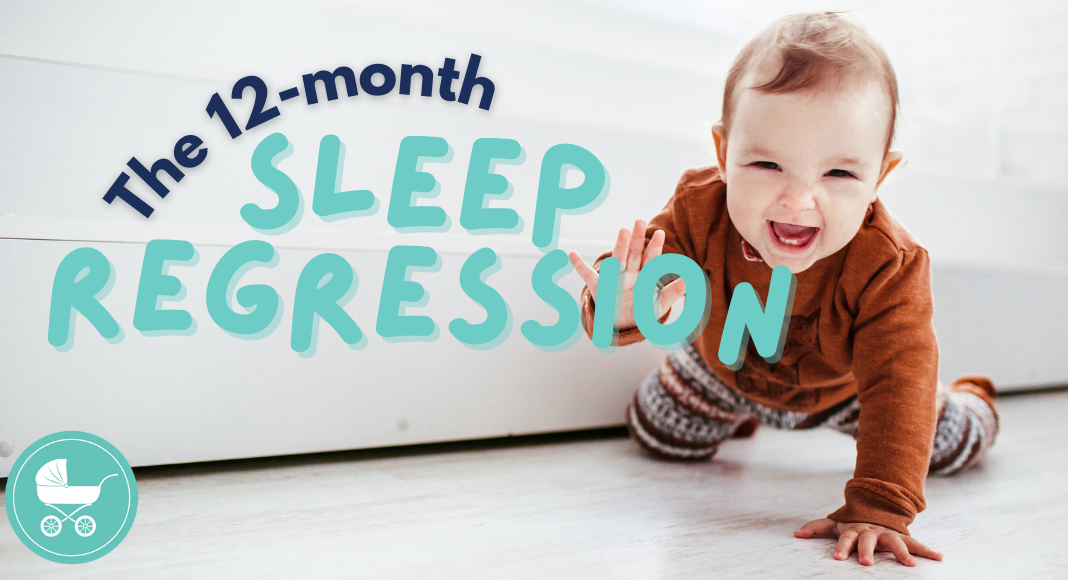
August 14, 2022
Ohhhh the 12-month sleep regression. This one can be a doozy. This regression can be a sneak attack because it often doesn’t show up in nighttime sleep until later when their daytime routines are all off. This regression has a lot to do with the child’s naps. You might find that your baby suddenly starts refusing […]
The 12-Month Sleep Regression
Ohhhh the 12-month sleep regression. This one can be a doozy. This regression can be a sneak attack because it often doesn’t show up in nighttime sleep until later when their daytime routines are all off. This regression has a lot to do with the child’s naps. You might find that your baby suddenly starts refusing his or her second nap, and tries to get by with just one nap. This is where many parents begin to assume it’s time for their child to transition to one nap and start creating a schedule based off of that. However, we urge parents to treat this one as a regression instead, since most toddlers really aren’t ready to transition to just one nap a day until about 13-18 months.
What Happens: Like other sleep regressions, the one-year regression is characterized by more frequent night wakings and shorter nap intervals, if not resisting nap times altogether. Your child may revert back to habits of a younger baby, and demonstrating what some call the “3 C’s”: clinginess, crying and crankiness.
Why It Happens: Your baby is rounding the corner into toddlerhood, learning how to go from cruising to walking and becoming interested in more physically demanding activities like climbing, pulling themselves up onto things, throwing a ball, etc., especially if they have older siblings who are far more mobile than they are. They’re learning so many new physical skills that it oftentimes disrupts sleep. At the same time, your little one’s vocabulary and cognitive skills significantly increase around the one year mark. They can usually say between 1-3 words, use gestures to communicate, begin to express some independence and interest in making their own choices, listen intently to stories, songs and nursery rhymes to understand them better, and can understand and execute very simple instructions, such as “pick up this toy” or “come to mama.” While they’re growing and learning new things and seemingly becoming more independent, separation anxiety can also set in at this age, which also impacts sleep in a big way. Along similar lines, your baby may also be starting to cut their first set of molars, which can be extremely painful compared to smaller baby teeth.
How It Changes Sleep Patterns: This regression typically lasts for 2-6 weeks, coming on suddenly and oftentimes ending just as fast as it began. It’s also around this time, though still quite early, that some babies may begin to merge nap times, staying up longer, and sleeping for one longer period of the day versus taking a morning and afternoon nap. We suggest you chalk up a change in sleeping patterns first to a sleep regression before trying to modify your child’s naptimes, as it’s more often between 15-18 months that naps merge from two to one. If your child struggles with sleep for longer than 6 weeks, you may be dealing with poor sleeping habits versus just a regression. We’re here to help you change negative habits into positive ones and to restore the sleep everyone in your family needs by putting together a plan that will work for your family.
What To Do About It: Give your child opportunities to practice their new skills and engage them in both physical and mental activities that interest them during their awake time. Give them a chance to make simple choices, like choosing which shirt to wear, or which toy to play with, or what show to watch. Empower them by asking them to help you with simple tasks, like turning off a light switch, closing a cabinet door, putting something away. If teething seems to be a culprit, consult your pediatrician about pain relief options, especially for nighttime when teething tends to be the worst. Reassure your little one with lots of attention and snuggles while they’re awake, and if needed, lengthen the bedtime or naptime routine a bit temporarily to help with any separation anxiety your little one may encounter. It’s a very real fear for them to be left alone without you, so be patient and compassionate. It’s a phase that will pass, just like a sleep regression.
If all else fails, it might be time to introduce some sleep training techniques. To find the best technique for your family, check out our blog posts on sleep training methods. And, if you’re still having issues after a few weeks, feel free to schedule a call! We can develop a personalized sleep plan that will get your whole family sleeping in no time!
Get instant access to our free sleep class for children from newborn to 5 years old. You will learn how to get your child to sleep independently -- and all through the night!
Get Your Child To Sleep All Night Long in as Little as 7 Days!
join the free class
THE CLASS


